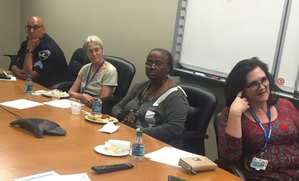Join us in San Antonio – Learn About Patient/Family Advisors in Multiple Roles and Settings
|
Is your hospital or practice in the early stages of developing a Patient and Family Advisory Council? Or are you looking for effective ways to integrate the experience and expertise of patients and families in QI teams or board-level committees? IPFCC's Moving Forward with Patient- and Family-Centered Care: Partnerships for Quality and Safety ~ An Intensive Training Seminar offers sessions for both! View the agenda.

Julie Moretz (pictured right) with
Dr. Richard Turnage of UAMS |
Faculty member Julie Ginn Moretz, Associate Vice Chancellor for Patient- and Family-Centered Care at the University of Arkansas for Medical Sciences, will lead one session describing critical initial steps for creating a PFAC and, in another session, provide guidance for "seasoned" councils and the challenges they may face.
Expert advice about involving patients and families will extend well beyond hospital settings or establishing PFACs. IPFCC CEO and President, Beverley Johnson will lead a session about selecting and supporting patients and families as members of governing boards and other faculty members will share experiences about partnering with patients and families in primary and ambulatory care.
Related seminar sessions will address:
- The Role of the Staff Liaison for Councils and Other Collaborative Roles
- Growing Your Skills as a Patient and Family Advisor
- Walk Abouts and Photo Voice—Two Practical Strategies to Engage Staff and Advisors
- Developing and Maintaining a Peer Mentor Program
- Collaborating with Patients and Families for Quality Improvement
- All Teach, All Learn: Engaging Patients and Families as Partners in Safety
- Involving Patient and Family Faculty in Medical Education and Orientation Programs
Download the brochure
Register today for the seminar!
|
Patient Engagement Survey: Far to Go to Meaningful Participation
|
The September 14, 2016 issue of the NEJM Catalyst summarized its second Patient Engagement Survey. More than 69% of respondents report that their organizations use patient engagement initiatives to increase patients' meaningful participation in care. Among the responses: Respondents said care coordinators are essential (36%), very important (30%), or important (24%) in improving patient engagement. Other mechanisms to engage patients in their own care believed to be beneficial include patient portals and using patient-generated data. Sixty six percent of respondents said that "patient advocacy structures" such as Patient and Family Advisory Councils were seen as important or very important and 17% viewed them as essential. Since health care organizations are less familiar with advisory roles for patients and family members as a core patient engagement strategy, this was an encouraging finding. Read the full article.
|
PFACs in Michigan Health Systems
|
Read about PFACs at Beaumont Health, Spectrum Health, and St. Joseph Mercy in Ann Arbor:
Healthy advice: A growing number of patient, family councils help guide hospital operations
Hospital CEO makes rounds to monitor care
|
IPFCC Collaborations with Premier, ACP, and PCPCC
|
IPFCC is delighted to continue its work with Premier in reducing hospital harm and readmissions as a partner in their Centers for Medicare and Medicaid Services (CMS) as a Health Improvement Innovation Network (HIIN). For further information about the Premier HIIN, contact HIINSupport@PremierInc.com.
IPFCC is also pleased that its ongoing work with the American College of Physicians (ACP) and the Patient- Centered Primary Care Collaborative (PCPCC) will continue with their Support and Alignment Networks (SAN) for the CMS-funded project, Transforming Clinical Practice Initiative.
Currently, we are working on a medication adherence module for ACP and are seeking examples of strengths-based approaches to meaningful dialogue about medications as well as access and support for integrating medication in patients' daily lives. If you have ideas to share about medication adherence, contact Mary Minniti before November 1st at mminniti@ipfcc.org.
|
Primary Care Corner – Advisors at MetroHealth J. Glen Smith Health Center
|
Operating in conjunction with the Cleveland Department of Health, the MetroHealth J. Glen Smith Health Center is supported by MetroHealth's full scope of services including comprehensive inpatient and outpatient services and subspecialty referral care. The Center provides the following care options: Infectious Disease Counseling, Internal Medicine, Medicare Wellness Visits, Nutrition Counseling, Obstetrics & Gynecology, Pediatrics and Social Work.
The Patient-Centered Medical Home Quality Committee at J. Glen Smith began in 2014. Brenda Metzger is one of its members. Her primary care physician, Joseph DaPrano, MD, whom she has seen since 2002, chairs the Committee and encouraged her to join. Dr. DaPrano is also the Medical Director of the Health Center. When Brenda attended a training program for patient/family advisors (PFAs), she was also invited to serve as a member of The MetroHealth System Patient and Family Advisory Council.

Brenda Metzger (pictured second from the right)
with MetroHealth PFAC
|
As a PFA, Brenda has provided input on the after visit summary, billing systems, and community outreach and information programs. Brenda feels strongly that MetroHealth cares about its patients, including those with chronic conditions like high blood pressure and diabetes who need to visit their primary care providers regularly. But lack of public awareness about MetroHealth's services to the community (e.g., transportation to appointments, sliding scale fees) is a real barrier to care and the PCMH Quality Committee is actively addressing those issues.
According to Joseph DaPrano, MD, Medical Director of the Health Center, "The MetroHealth System is very committed to serving its community. Too often, though, the people we most want to help don't know about our services – or are reluctant to use them. Having a member of the community like Brenda on the Quality Committee is invaluable in pushing us to think of new strategies for outreach and public awareness."
Brenda offers the following advice to other patients and families, "If you want change, you have to be part of it – from the inside! 'The powers that be' at MetroHealth really listen but patients and families have to tell them what they need."
IPFCC is partnering with the Patient-Centered Primary Care Collaborative (PCPCC) as part of its Transforming Clinical Practice Initiative (TCPI) Support and Alignment Network (SAN). This column provides highlights from the field.
If you already partner with patients and families to improve primary or ambulatory care and want to share your successes, or you want to learn more, IPFCC hosts a free online learning community for Primary and Ambulatory Care Partnerships on its PFAC Network. For more information about joining, please contact Mary Minniti at mminniti@ipfcc.org or sign up on IPFCC's PFAC Network.
|
PCPCC is providing registration scholarships to IPFCC's Seminar in San Antonio, TX in November as part of TCPI. A few scholarships remain for primary or ambulatory practices and their patient/family advisors to attend.
Act now and contact Mary Minniti at mminniti@ipfcc.org for an application or more information.
|
|
In this Issue
|
- San Antonio Seminar – Learn about Patient/Family Advisors in Multiple Roles and Settings
- Patient Engagement Survey: Far to Go to Meaningful Participation
- IPFCC Collaborations with Premier, ACP, and PCPCC
- Primary Care Corner – Advisors at MetroHealth J. Glen Smith Health Center
- IPFCC Webinars
- Integrating Oral Health into Primary Care – Recently Published Tools
- Innovations in Pediatric Care Highlighted from IPFCC's 7th International Conference
|
IPFCC Webinars
|
|
November 6, 2016
Measuring Patient- and Family-Centered Practice and the Partnerships with Patients and Families
Establishing a system to track and measure the process and outcomes of patient- and family-centered care is critical to creating and sustaining successful change in organizational culture. Join IPFCC President & CEO Bev Johnson for this webinar. She will share useful resources, dashboards, and other tools. Get more details and register.
Recording Now Available
Building Self-Management Support in Primary and Ambulatory Care
How can primary and ambulatory care practices have a key role in self-management support? Mary Minniti, CPHQ and patient advisor,
Bryant Campbell explore implementation of effective self-management programs. Best practices from the perspective of a patient are shared. Register to access the recording.
Recording Now Available
Leveraging the Principles of High Reliability to Advance Patient and Family Engagement in Safety
Listen to Juliette Schlucter and Dr. Fiona Howard Levy as they outline two important frameworks that organizations have used successfully—high reliability and patient- and family-centered care—to advance patient and family engagement in safety. Register to access the recording.
|
IPFCC's webinars are a cost-effective educational resource. Cost is per line, so a group of any size can participate from the same location on one line. Learn more about webinar faculty, learning objectives, and Pinwheel Sponsor discounts.
|
Integrating Oral Health into Primary Care – Recently Published Tools
|
A free resource from the Safety Net Medical Home Initiative Resource Library, the Oral Health Integration Implementation Guide, provides clear instructions for integrating oral health into a primary care practice, and includes 22 tools developed in partnership with 19 field-testing sites.
The Oral Health Integration in Primary Care Project was sponsored by the National Interprofessional Initiative on Oral Health, a consortium of funders and health professionals who share a vision that dental disease can be eradicated, and funded by the DentaQuest Foundation, the REACH Healthcare Foundation, and the Washington Dental Service Foundation. IPFCC was proud to be part of this project.
|
Innovations in Pediatric Care Highlighted from IPFCC's 7th International Conference
|
An advance online publication of an article that will appear in the November/December issue of Pediatric Nursing journal highlights pediatric sessions from IPFCC's 7th International Conference on Patient- and Family-Centered Care. Read the full article (Articles of Interest).
|
IPFCC Seminar in
San Antonio
November 16-18, 2016

|
Thanks to MEDNAX for providing leadership support and to the other hospitals in the coalition providing support.
Program partners:
|
Links
|
|
|
| Previous Issues |
|
|
About Us
|
Founded in 1992 as a nonprofit organization, the Institute for Patient- and Family-Centered Care (IPFCC) works to advance the understanding and practice of patient- and family-centered care in all settings where individuals and families receive health care.
|
|